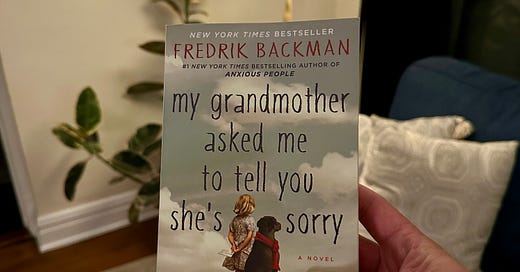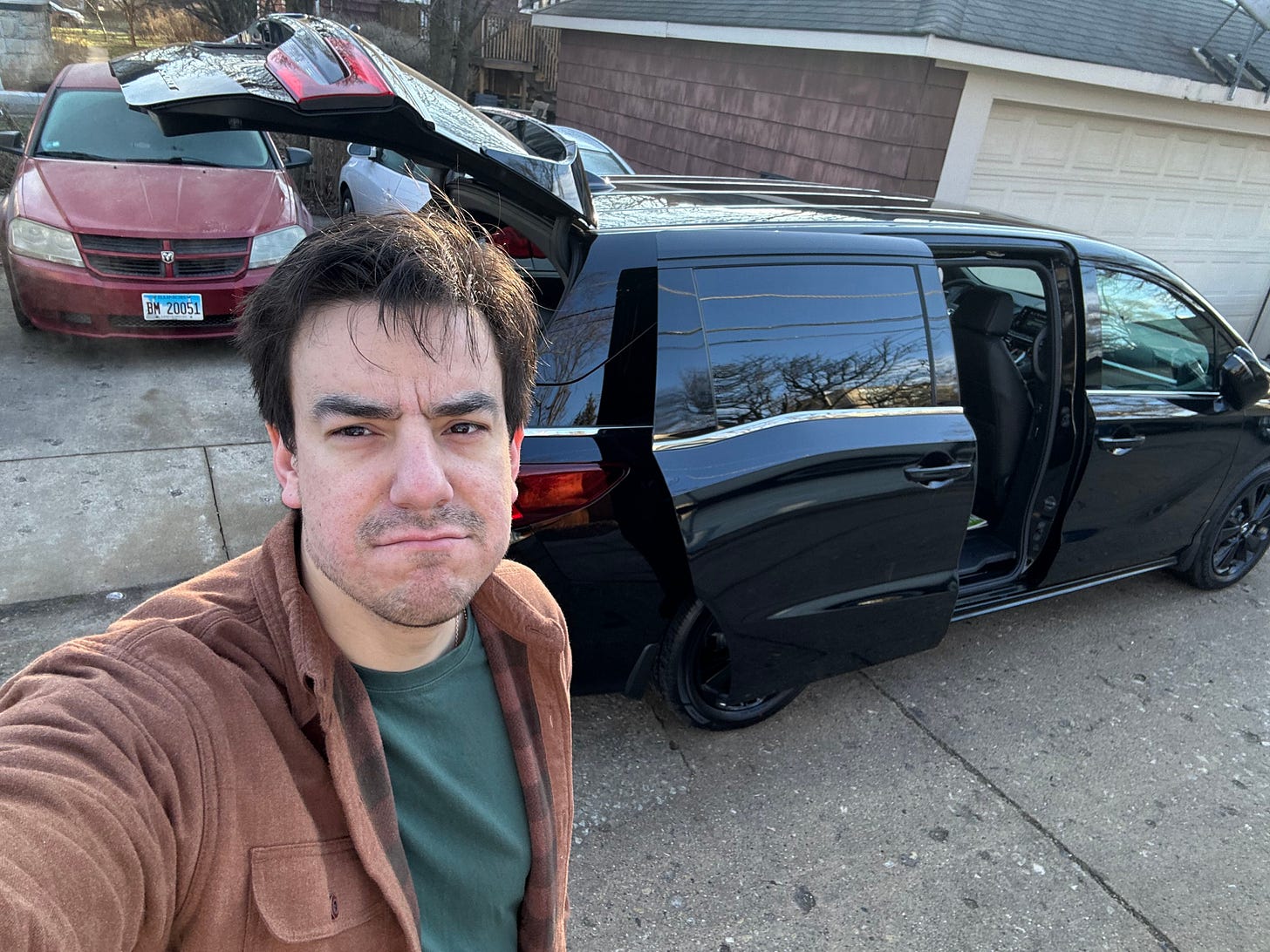"Broken" Homes
A thirty-one-year-old male millennial's retrospective on divorce, as inspired by Talladega Nights, his own journey, and one delightfully complex novel.
It may prove unnecessary, but trigger-warning. I reflect meaningfully on my parents divorce throughout this article. While I am proud of what I’ve written, and think it’s a worthy read, I understand if you decide to skip this one.
If you’re a millennial, and especially if you’re a male millennial, chances are you’ve enjoyed the 2006 classic Talladega Nights: The Ballad of Ricky Bobby. A ridiculous film about family, and NASCAR1 culture. I don’t remember where I watched it for the first time, but I do remember I was thirteen, probably ate far too many Flaming-Hot-Cheetos, over-ordered Domino’s pizza, and watched it many times over in various friends basements. To think what we might have achieved had this film (and others like it) never been released, haunts me to this day. Yet, here I stand, a man indelibly marked by mid two-thousands comedies.
Now, if you have no idea what I am talking about, let me briefly summarize Talladega Nights and its silver-screen contemporaries. Simply put, these films are unfathomably vapid, but unyieldingly quotable. Turbo-boosted dialogue like,
Shake and bake!
Help me Tom Cruise!
If you ain’t first, you’re last!
I don’t know what to do with my hands…
Dear, six pound, eight ounce, baby Jesus…
Why don’t you go ahead and break my arm?
Chip, I’m gonna come at you like a spider-monkey!
all comes from Talladega Nights alone!
No doubt, many of you recognize these quips, and again, if you’re a man at least my age, you likely recall employing them heavily. Regrettably, my high school lexicon was deeply shaped by these quotes. The sayings were so common-place that my church friends, and even my youth pastor, used them constantly! But why?
Well, as one negotiates the labyrinth of absurdity in any comedy –whether it be Talladega Nights or a more respectable comedy of your choosing– you will find that what makes any film funny isn’t its proximity to lunacy, but to the truth. The aforementioned lines were so impactful to high schoolers like me, not because they were stupid (though admittedly they were), but because they mirrored the inside jokes my friends and I were already using, as well as our lived experience as outrageous high school boys. For a solid decade, long before memes were memes, and the fracturing of the mono-culture, every guy I interacted with, no matter the context, shared the language of Talladega Nights…
With that said, I would like to engage with one more quote from Talledega Nights, before shifting gears.
There comes a moment in the film, in which (the protagonist’s) Ricky Bobby’s wife declares her intent to leave him. As he receives this news the camera zooms from character to character, capturing their reactions. Ricky Bobby, is stunned and appalled, his wife feigns regret, and apologizes; all the while, his friend’s awkward commentary makes things worse. Tracking this ten-car-pile-up, the camera cuts to the children (Walker and Texas Ranger) of the now separated couple, and with one jubilant voice, the two boys exclaim the infamous punchline: “Yay! Two Christmases!”
Now, before you express your distaste, know that his movie wears absurdity on its sleeve like the sponsor-logo of a race-car. Furthermore, at this point in the film, the writers have taken their time to thoroughly establish these children as especially awful. No one should watch this film, or read this summation, and conclude that the movie writers (or this writer) take divorce lightly. In other words, it’s a joke. Is it a rough joke? Yes. Funny for some, painful for others, but a joke nonetheless. A joke that hits quite close to home. A joke I will delicately use to reflect on my own life, and recommend the lovely novel, my grandmother asked me to tell you she’s sorry.
In case you didn’t know, I was five years old when my parents divorced, and ever since that day, though with less frequency now, I’ve been asked questions like: What was it like as a child of divorce? How did growing up in a broken home effect you? What do you remember from that season of your life? and more. Which is okay, but its also a lot. Over the years, I test-drove all sorts of answers: short ones, medium ones, and long ones. Believe it or not, as a young boy, I would even occasionally reference celebrating Christmas twice! Hey, when someone put ten-year-old Greg on the spot, rest assured they got more than they bargained for. Much like Ricky Bobby’s son Texas Ranger, I was “All jacked-up on Mountain-Dew.” I guess Talladega Nights was on to something. Humor’s circuit traces honesty.
Twenty-six years later, with two kids of my own, a meaningful amount of maintenance with counselors, and countless laps around family-of-origin-dynamics with my wife and close friends – I’m happy to report I have better answers. I’m more gentle with the throttle, break earlier at corners, and pit-stop far more readily. Where young Greg was pedal to the metal in his dream car, a canary-yellow Ferrari 458 Italia, old Greg drives a Honda Odyssey. Though, admittedly, the blacked-out sport trim. I guess I’m still fairly “pedal to the metal,” as far as suburban dads go.
I call this bad-boy my SAV, or Suburban Assault Vehicle (Trademark, Greg Molina, 2024),
and I win the Whole Foods Grand Prix with it weekly. We’re actively looking for sponsors.
Continuing toward our destination, adult Greg’s divorce-question answers are more developed, thoughtful, and always include three key elements.
One, let’s call them the, “unique,” ways I interact with my family (whether through blood or by marriage). Two, my ability to contextually adapt quite readily (I grew up in two very different places simultaneously. Namely, Oak Park and Humboldt Park). And three, the deep sense of independence I developed at young age.
I want to acknowledge right away, that all of the above “post-divorce” character traits are written at worst, as neutral, and could even be read as abjectly positive. While that is intentional, don’t get me wrong, divorce wounded me. I suffered, and struggled meaningfully as it happened, and for many years after. Although I, by God’s Grace, confidently count myself amongst the well-adjusted, the wounds of that event have left me with plenty of deficiencies. Thankfully my loved ones are all very kind.
But I am intentionally steering towards a tension –the tension between my very real struggles, and my equally real strengths– and in so doing, I am circling the paradoxical point of this article, Fredrick Backman’s novel, and if I may be so bold, the meta-point point of Talladega Nights:
My strengths and my weaknesses; all of my good, my bad, and my ugly, were aspirated by the same set of circumstances. Namely, growing up in a “broken” home, splitting time between two houses and neighborhoods, and having –as we often so crassly put it– two families.
In my observation of others, it seems this juxtaposition is often untenable. They hear about, or encounter a kid they know comes from a “broken” home, and immediately (often unnecessarily) over sympathize. I get it, trust me, and by no means do I intend to glamorize or declaw divorce, but I have spoken with people who seem amazed that my parents separation didn’t irrevocably wreck me. Friends, we can’t ignore the burdens of divorce (and we almost never do), but we shouldn’t totalize them either.
I could write about this for pages, but I would at some point bore you and get in trouble (assuming I haven’t already). Crossing the finish line therefore, it is for these reasons, hopefully sufficiently nuanced, that I greatly enjoyed, and earnestly recommend Fredrick Backman’s insightful novel, my grandmother asked me to tell you she’s sorry!
As I cruised through it, taking in the drama, intrigue, and character development, I realized it’s the only media I’ve ever consumed that understands, honors, and articulates the unique perspectives, and strengths, of young children of divorce. The third person omniscient narration is splendid, and witty, but cuts to the quick. The book is far from exclusively about divorce, and has plenty of merit a part from its dealings with the subject, but these themes are central to the nature of the story. I will forever be grateful to Backman, for his efforts. Much more tactfully than Talladega Nights, I might add, Backman manages to respectfully play with the awkward social, familial, and even parental dynamics that children of divorce experience in a way that is genuinely hilarious, yet inoffensive.
For my millennial peers, the book is also quite unnerving in a fun way. You know how weird it is when you realize the vast majority of pro and olympian athletes are now younger than you? This book offers that feeling through pop-culture references. It’s the first book I’ve read that alludes to the media pillars of my childhood, as opposed to say, the 80s. Knowledge of the plot devices and world of Harry Potter, for example, is a priori for Backman’s characters.
Finally, as a Christian and as a pastor, I will share one final reflection. It’s a slight retread of my previous post, and most likely a pre-tread of the future.
The primary reason I discuss these events from my past so freely, and positively, is a whole-hearted belief that the God of the Bible is able, has for me, and desires for everyone, to work all things together for the good of those who love him, and are called according to his purposes (Romans 8).
I hope you found this short but earnest reflection helpful. Minimally, I hope you go read and enjoy my grandmother asked me to tell you she’s sorry. Thanks for reading and…
In case you didn’t know, NASCAR is an acronym for the National Association of Stock Car Auto Racing.







Thanks for your vulnerability, Greg! I love both Talladega Nights and Backman's book, but would not have made that comparison... thanks for sharing about the fullness of your experience - from the ongoing challenges to the redeemed.
Thanks, Greg, for your honesty. Very refreshing! Both my children went through heartbreaking divorce situations. It was difficult as a mom watching them go through that process and pain and all I could do was be there for them and pray for them.
I’ll certainly keep you in prayer.